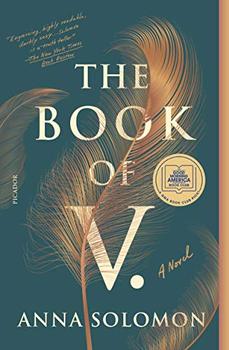Book Club Discussion Questions
Want to participate in our book club? Join BookBrowse and get free books to discuss!
Please be aware that this discussion guide will contain spoilers!
- The novel opens with a quote from Elizabeth Cady Stanton: "I have always regretted that the historian allowed Vashti to drop out of sight so suddenly." Why do you think the author chose this quote? What do you think it means in context of what happens in The Book of V.?
- The Book of V. is told from the viewpoints of three women, from different time periods and life experiences. Why do you think the author chose to include this diverse [range/collection] of voices? Did you relate more to one woman than the other? Which one, and why? How did this narrative style impact your reading experience?
- Before reading, what did you know of the story of Esther from the Old Testament? Why do you think the author chose to incorporate Esther's tale as part of the novel, and how do you think it relates to the other characters' stories?
- In the book's opening chapter, Lily characterizes the story of Esther in this manner: "Really all you need to know, and all anyone remembers anyway, is that the second Queen, Esther, is the hero." In thinking of the novel's Esther and her story, do you agree with Lily's appraisal? Why or why not?
- The novel's three parts are entitled: "Exile," "Wandering," and "Reinvention." How do each of the three main characters embody these themes? Why do you think the author chose to divide the novel and title each part in this way?
- Motherhood is an important theme in The Book of V.; discuss the mother-child relationships in the novel. What do these relationships have in common, and how do they differ?
- Talk about the husbands in The Book of V. Do any of them share similarities? Discuss their relationships with their respective wives; what are some of the hallmarks of each?
- Discuss examples of women who have been publicly humiliated by their husbands or partners; how did these women handle their situations? If you experienced the same degradation as Vashti or Vee, what would you do in response?
- The Jewish festival of Purim celebrates Esther's liberation of the Jewish people from execution. Purim figures prominently through The Book of V.; discuss its origins and traditions, how the holiday emerges in the narratives of the main characters, and what it might mean.
- There are multiple invocations of biblical characters in the names the author chose for her characters. Identify several examples and discuss them: why do you think the author chose to include this symbolism?
- Women's equality and empowerment is a theme that is woven throughout the stories in The Book of V. Discuss Vee's alternate identity as Letty Loveless, advice columnist in a women's magazine. Was this a surprising revelation about her? Why do you think the author chose this role for her?
- Vee, Lily, and Rosemary all grapple with questions of identity, ranging from their gender roles to their religion. What are some examples of their personal struggles to define themselves?
- As the novel nears its conclusion, we discover the connection between Vee and Ruth; did this revelation surprise you? Did you notice any clues or foreshadowing as you read?
- At the very end of the novel, Lily imagines telling her daughters: "The type of woman you imagine yourself becoming does not exist." Why do you think she wants to convey this sentiment to them? Do you agree with her assertion?
Unless otherwise stated, this discussion guide is reprinted with the permission of Picador.
Any page references refer to a USA edition of the book, usually the trade paperback version, and may vary in other editions.




